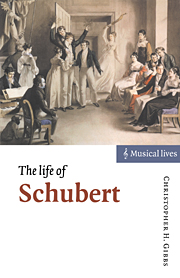Book contents
- Frontmatter
- Dedication
- Contents
- List of illustrations
- Acknowledgments
- Note on the text
- List of abbreviations
- Prologue: Schubert yesterday
- 1 Representing Schubert: “A life devoted to art”
- 2 Young Schubert: “The master in the boy”
- 3 Ingenious Schubert: “The prince of song”
- 4 Popular Schubert: “The turning point”
- 5 Dark Schubert: “A black-winged demon of sorrow and melancholy”
- 6 Poor Schubert: “Miserable reality”
- 7 Late Schubert: “Who shall stand beside Beethoven?”
- 8 Immortal Schubert: “Composing invisibly”
- Epilogue: Schubert today
- Notes
- Further reading
- Index
5 - Dark Schubert: “A black-winged demon of sorrow and melancholy”
Published online by Cambridge University Press: 05 March 2015
- Frontmatter
- Dedication
- Contents
- List of illustrations
- Acknowledgments
- Note on the text
- List of abbreviations
- Prologue: Schubert yesterday
- 1 Representing Schubert: “A life devoted to art”
- 2 Young Schubert: “The master in the boy”
- 3 Ingenious Schubert: “The prince of song”
- 4 Popular Schubert: “The turning point”
- 5 Dark Schubert: “A black-winged demon of sorrow and melancholy”
- 6 Poor Schubert: “Miserable reality”
- 7 Late Schubert: “Who shall stand beside Beethoven?”
- 8 Immortal Schubert: “Composing invisibly”
- Epilogue: Schubert today
- Notes
- Further reading
- Index
Summary
There were also times when a black-winged demon of sorrow and melancholy forced its way into [Schubert's] vicinity – not altogether an evil spirit, it is true, since, in the dark, consecrated hours, it often brought out songs of the most agonizing beauty.
Eduard von Bauernfeld, 1869 (SMF 234)Schubert had been seriously ill for more than a year when he penned unusually anguished words to Leopold Kupelwieser on the last day of March 1824:
In a word, I feel myself the most unhappy and wretched creature in the world. Imagine a man whose health will never be right again, and who in sheer despair over this ever makes things worse and worse, instead of better; imagine a man, I say, whose most brilliant hopes have perished, to whom the happiness of love and friendship have nothing to offer but pain, at best, whose enthusiasm (at least of the stimulating kind) for all things beautiful threatens to disappear, and I ask you, is he not a miserable, unhappy being?
Schubert reached out desperately to his close friend, who was in Rome painting and studying art: “at last I can once again wholly pour out my soul to someone.” He had confided to Schober earlier: “I hope to regain my health, and this recovered treasure will let me forget many a sorrow” (SMF 301). While the omnipresence of the sick and the dying in an overcrowded city such as Vienna made illness and mortality all-too-familiar aspects of everyday life, perhaps this familiarity also made them somewhat less terrifying. Grave illness only intensified an acquaintance with death that Schubert had known for years. His mother died when he was fifteen; only five of fourteen siblings from his father's first marriage survived childhood.
Although Schubert's health had apparently been robust until this point, letters make painfully clear that he was under no illusions once it was shattered: his life was forever changed.
- Type
- Chapter
- Information
- The Life of Schubert , pp. 91 - 114Publisher: Cambridge University PressPrint publication year: 2000

